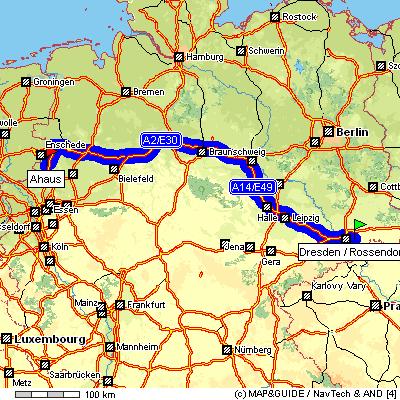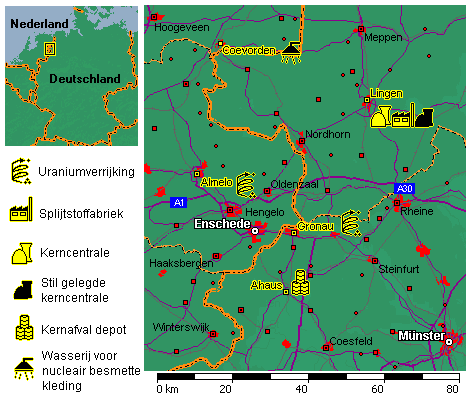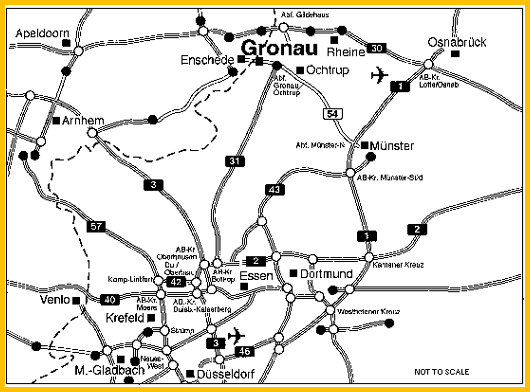Call to block nuclear trucking to Ahaus
Diet Simon - 05.04.2004 15:11
Activists are calling for highway blockades to stop trucking of nuclear waste more than 600 kilometres east to west across Germany to a thin-walled hall not safe from air crashes. After plans for the trucking were approved on 1 April, activists say it can start from 27 May. The Saxon government has announced it will start the trucking at the end of May. A spokesman for the North-Rhine Westphalian government said no dates have yet been agreed. The number of transports remains unclear, but experts say at least nine will be necessary, possibly 18.

One possible route.

Cross-border nuclear concentration.

Uranium enrichment town Almelo.

Uranium enrichment town Gronau.
One problem is that there are not enough fixing points on the low-loader trucks to secure the so-called MTR-2 Castor caskets, explained a spokesman for the trucking company, Nuclear Cargo + Service (NCS), a subsidiary of the German railways. This made several consignments necessary, he said, although the licensing authority, the Federal Radiation Protection Agency, has ordered a “bundling”. “There will have to be at least nine transports,” the spokesman was quoted as saying.
Nearly a thousand highly active spent fuel rods are to be moved in from a decommissioned research reactor at Rossendorf near Dresden (90 km west of the Polish border) to Ahaus (25 km east of the Dutch border), near Münster. Some details in English about the Ahaus storage are at  http://www.oneworldweb.de/castor/ahaus/internat/english.html. http://www.oneworldweb.de/castor/ahaus/internat/english.html.
“It’s also up to us whether trucking begins then,” say the activists. “What’s needed now is resistance and a lot of creativity in planning actions. It’s getting serious. With the start of the transports, the sand clock will start to run. Whether the North-Rhine Westphalian state government follows through on its announcement that it would stop the transport in one way or another is immaterial. What counts for us is what happens on the road.”
The map shown here shows the shortest route, 611 km, per autobahn (motorway), picked by the ADAC motoring club’s computer. It need not be the route ultimately taken.
“The same trucks have to run back to Dresden,” say the activists, “which means the entire route driven will be the small matter of 10,800 km.”
“That is why we call for the trucks to be hindered both ways, there and back. There must not be a quiet moment for the runs on the autobahn, no matter whether a Castor is loaded or not. Let’s turn Day X into a Month X!”
If every trip has to be secured by a full police team, the activists argue, the exercise will either become long drawn out and/or it will have to be quickly ended.
“So get familiar with the autobahns to be used. Plan camps or actions at individual sections, start initiatives and do publicity work. As resident along the autobahn you can also file objections against the transports. Raise the transports in local parliaments.
“There are enough ideas. The Castors haven’t started rolling yet. And Castors in the warm summer are at least good for resistance – real camping weather, short nights....”
The activists demanded from the conservative city government of Ahaus that it support demonstrators if the transports happen by letting them sleep in schools and other public buildings. They accused the NRW state government of failure.
Despite the protestations of the Social Democrat-Greens government in Düsseldorf, the said, it had taken no steps to prevent the transport permit being issues by the agency for radiation protection.
Instead, NRW interior minister, Fritz Behrens, had internally give assurance of police protection for the 18 Castors, the activists’ statement said. By that the state government had played “a double game” and deceived the people in the Ahaus area.
The nuclear opponents called on the NRW government to declare the Ahaus storage facility unsafe and to prevent all further waste storage there. The hall cannot withstand aircraft crashes and terrorists attacks, they say.
The research centre at Rossendorf ( http://www.fz-rossendorf.de/) is about 10 kilometres northeast of Dresden (population 480,000), Germany’s 15th largest city. The “interim storage” facility for nuclear waste at Ahaus (pop. 40,000) lies about 55 kilometres northwest of Münster (pop. 268,000), 10 kms from the Dutch border and 25 kms from Enschede (pop. 150,000), the Netherlands’ ninth largest city. http://www.fz-rossendorf.de/) is about 10 kilometres northeast of Dresden (population 480,000), Germany’s 15th largest city. The “interim storage” facility for nuclear waste at Ahaus (pop. 40,000) lies about 55 kilometres northwest of Münster (pop. 268,000), 10 kms from the Dutch border and 25 kms from Enschede (pop. 150,000), the Netherlands’ ninth largest city.
Ahaus lies in a nuclear concentration area on both sides of the German-Dutch border. There are uranium enrichment plants at Gronau ( http://www.urenco.com/htm/locations/gronau.htm) in Germany and Almelo ( http://www.urenco.com/htm/locations/gronau.htm) in Germany and Almelo ( http://www.urenco.com/htm/locations/almelo.htm) in The Netherlands. Both belong to Urenco Ltd., a joint British/Dutch/German company. In Lingen, Germany, there is a nuclear fuel fabrication facility, an operating nuclear power station and a decommissioned nuclear. power station. At Coevorden in Holland is a laundry for decontaminating radioactive work clothes, operated by American-owned Euro Nuclear Services B. V. ( http://www.urenco.com/htm/locations/almelo.htm) in The Netherlands. Both belong to Urenco Ltd., a joint British/Dutch/German company. In Lingen, Germany, there is a nuclear fuel fabrication facility, an operating nuclear power station and a decommissioned nuclear. power station. At Coevorden in Holland is a laundry for decontaminating radioactive work clothes, operated by American-owned Euro Nuclear Services B. V. ( http://www.u1st.com/ens/). http://www.u1st.com/ens/).
Ahaus protests are regularly supported by Dutch activists.
The next protest dates:
10 April: Preparatory conference Bremen, 8.30 p.m. in Buchtstr., homepage:  http://www.castor-gruppe-bremen.de.vu http://www.castor-gruppe-bremen.de.vu
16-18 April: Spring conference in Berlin
18 April: Sunday Strolls in Dresden and Ahaus
29 April – 2 May: Resistance camp in Ahaus with action, concerts and lots of fun. Homepage:  http://www.wigatom.de ¦ http://www.wigatom.de ¦
Meanwhile the German police trade union, DpolG, has joined the political fray by calling on demonstrators to protest in Saxony (Dresden) and not in North-Rhine Westphalia (Ahaus).
"If the Saxony state government insists on this senseless transport, it should also have to pay for the police deployment,” said DpolG state chairman, Rainer Wendt. "It would be a sad joke if the Saxon government, rubbing its hands in glee, could duck its responsibility while we had to assign thousands of police in North-Rhine Westphalia to protect the transports.
Wendt said, “There couldn’t be worse pigheadedness and ignorance than that of the Saxon state government.” Wendt called the Saxon premier, Georg Milbradt (a Christian Democrat, CDU) as "an enemy of the police and internal security if in the present tense security situation he provokes such a huge deployment.”
The Saxon interior ministry retorted: "It’s shocking when a police trade unionist incites nuclear opponents to protest against a transport approved by federal authorities.” It was an indirect call to commit criminal acts, said a spokesman.
There was a clear statement, he went on, that there was no way to avoid the transportation. Moreover, it was clearly regulated that each federal state had to pay the costs of police occurring in it.
The NRW government has said policing the transports would cost 50 million euros. Saxony rejects that figure as exaggerated.
The Social Democrat group in the NRW parliament says about 3,000 police will be needed in the state for each transport. The last time waste was transported to Ahaus in early 1998, 16,000 NRW police were assigned. In times of increased security needs after the train bombings in Madrid, the group say, it’s irresponsible to have these transports roll through Germany.
NRW says it’s still looking for ways to prevent the transports, which it calls “unnecessary and superfluous”. Moreover, they would tie up police needed elsewhere. If the transports could not be prevented, said a spokesman in Düsseldorf, NRW would urge bundling them.
Meanwhile the company running the Ahaus facility says the Castors from Rossendorf could be taken in at short notice and without great technical input. All technical preparations had been made, said a spokesman for the repository. So far only 50 of 420 standing places for Castors were occupied.
"This is a heavy blow against us,” commented NRW environment minister, Bärbel Höhn, of The Greens.
Apart from the waste from Dresden-Rossendorf, the German government is also said to have decided to put waste from all German experimental reactors, including weapons-grade uranium, for “interim storage” into the thin-walled hall at Ahaus.
In a media release published in German earlier this year at  http://de.indymedia.org/2003/12/68996.shtml, the Citizens Initiative Kein Atommüll in Ahaus (No Nuclear Waste in Ahaus) cites the high flow FRMII research reactor in Garching near Munich. http://de.indymedia.org/2003/12/68996.shtml, the Citizens Initiative Kein Atommüll in Ahaus (No Nuclear Waste in Ahaus) cites the high flow FRMII research reactor in Garching near Munich.
“This is although the nuclear waste from the FRM II is highly enriched uranium, usable for weapons and hence much more dangerous. This waste would turn the Ahaus storage into a “military high security sector”, the release said.
The anti-nuclear group also quoted a high environment ministry official, Reinhard Kaiser, telling them at a well-prepared meeting in Berlin, for which the activists had submitted written questions, that the French reprocessing plant in La Hague, which recycles German waste, will package it highly compressed from 2005.
“Probably from 2008 the waste from German nuclear power stations will be packaged there and brought to Ahaus. This process is to be completed by 2018. The containers, respectively the types of packaging and the composition of the waste, depend on the applicant and have no influence on the licensing of the return transports by the ministry.”
After that, said the groups release, the waste is to stay until 2013 in the Ahaus storage hall, whose operating licence would end by 2036 at the latest.
“We reject the planned return transports of partially undefined recycling waste from La Hague with partially highly toxic bituminised fluid wastes because of the lacking storage permit and the totally unsuitable storage Hall 1. The return transport to the producers initially planned by the environment minister is no longer part of the so-called “atomic consensus.”
|





